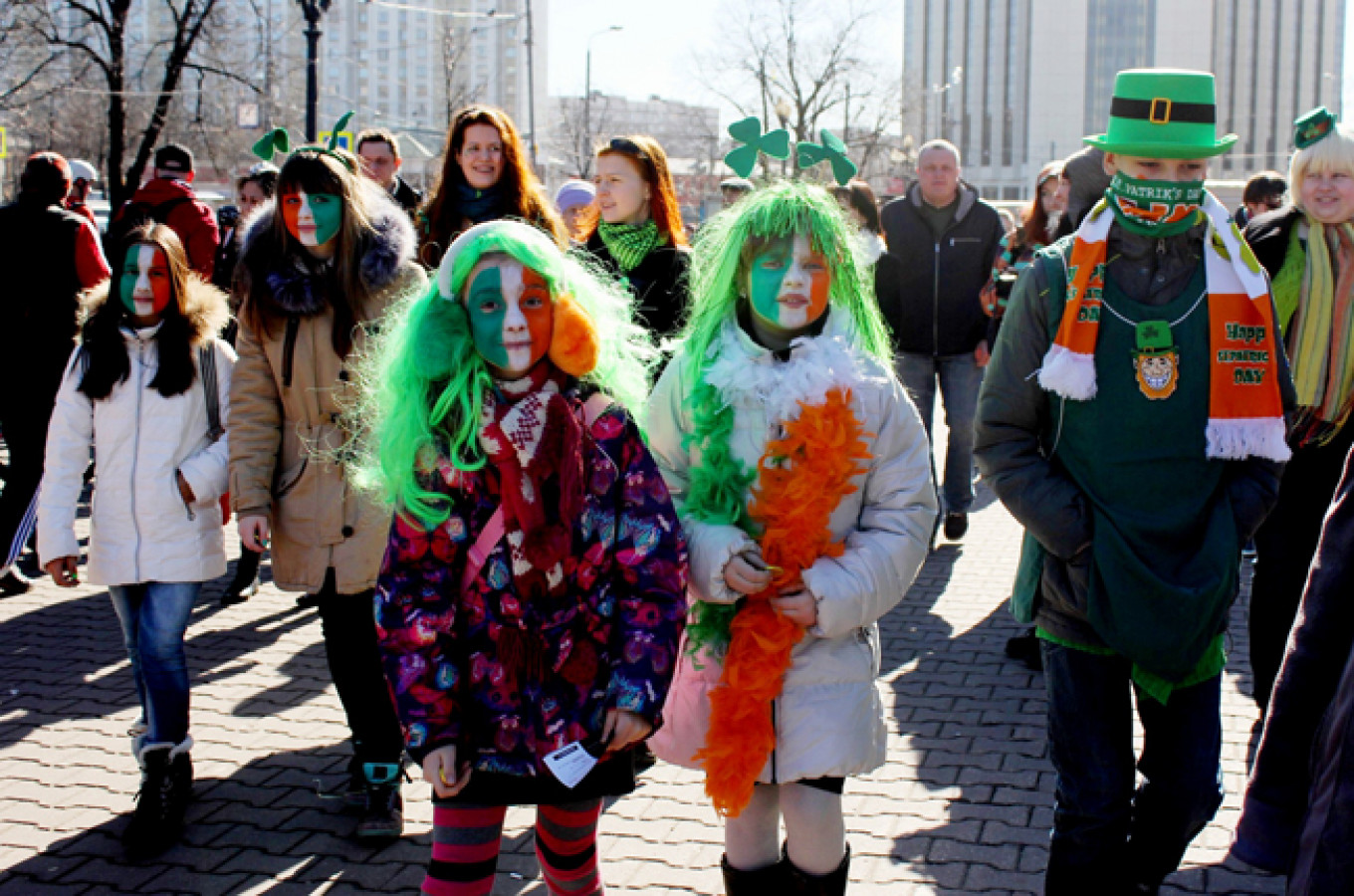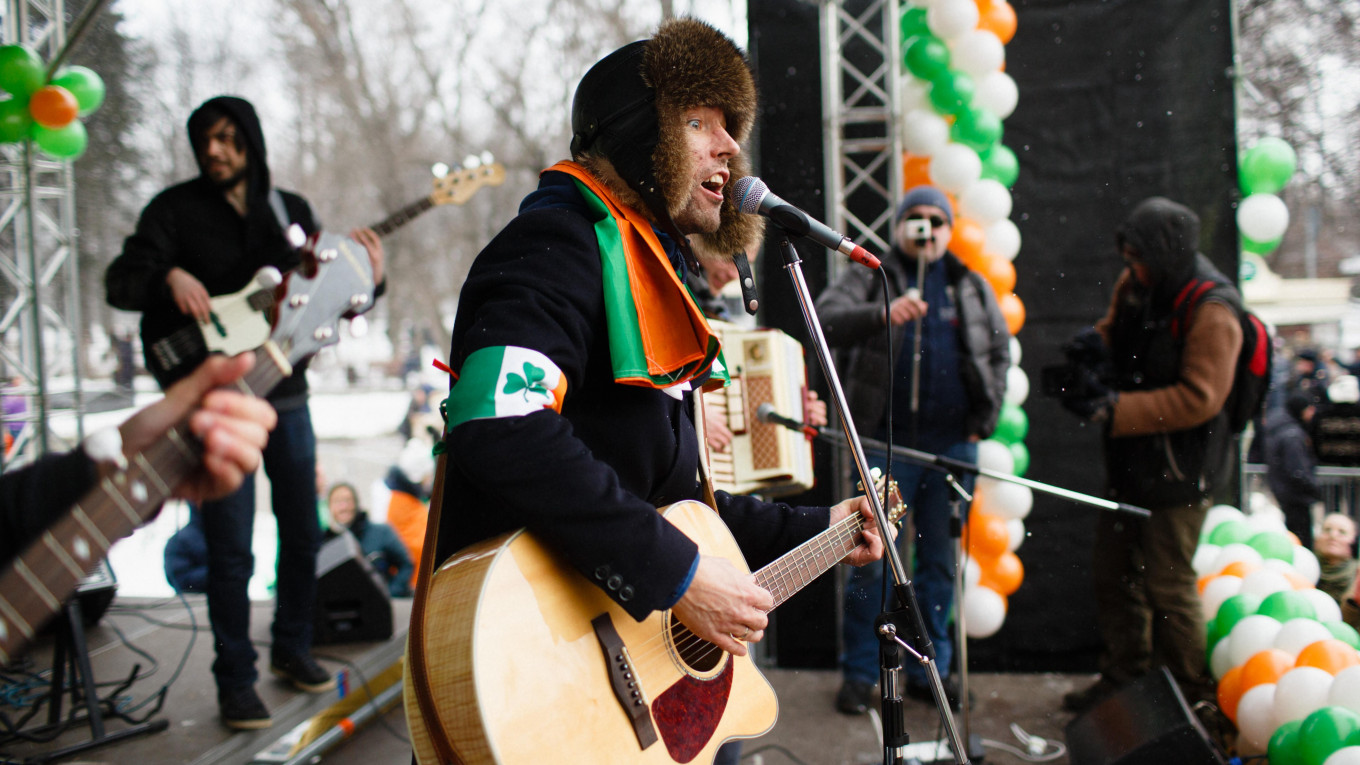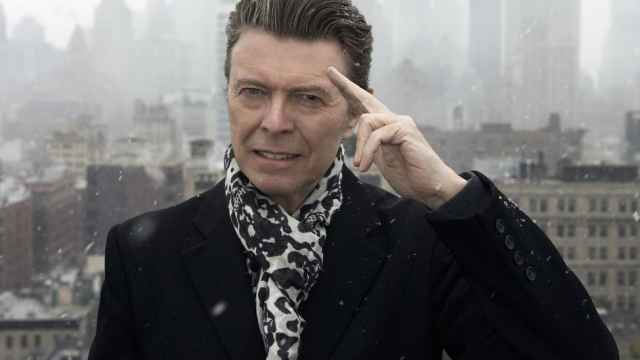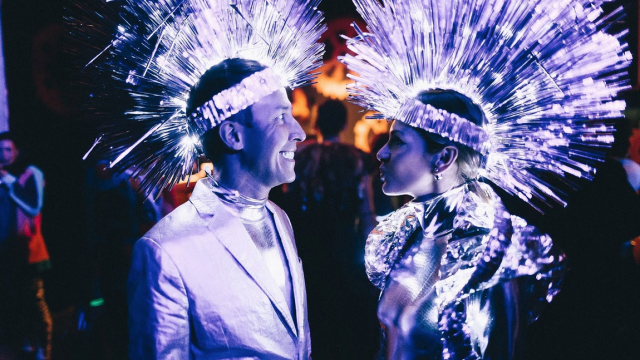Spring has yet to take hold in Moscow, but that doesn’t bother the locals: The city is turning green early as the annual Irish Week festival staggers on for its fifth year.
This year, the organizers are going all out with Irish music, literature, and dance. Events are taking place from March 15 to 26 across Moscow, including a St. Patrick’s Day Parade in Sokolniki Park. As if that wasn’t enough, buildings on Tverskaya will be “greening” up for the celebrations, just as they do in major cities around the world.
While St. Patrick’s Day often conjures images of Guinness-soaked revelers bellowing “Danny Boy,” Irish Week in Moscow involves more intellectual fare. This includes historical lectures and musical performances, as well as the Irish Film Festival, which is celebrating its 10-year anniversary.
The Irish Embassy’s Gerald MacCarthy, one of the festival’s co-founders, hopes to engage a wider local audience this year through “the legacy of Irish literature.” MacCarthy applauds educated Russians who “have read Joyce, Shaw and can hold a discussion [on Irish literature] on a level of depth.”
One of the new additions to this year’s event has a literary flavor, with a trio of budding Irish writers, Karl Geary, Deirdre Sullivan, and John Patrick McHugh, flying in to give readings from their debut novels and answer questions. The authors will appear at the Russian State Library of Literature and the Arts on March 18 and the Biblio-Globus bookstore on March 19.
Acolytes of Moscow’s trendy quests, meanwhile, can drop by the Gnezdo Gallery from March 21 for “Wool and Potatoes,” an interactive exhibition leading visitors through a set of mysterious documents associated with a fictitious “Ivan Skotinin.” Deep secrets connect the seemingly peaceful Soviet peasant to the Ireland of the 1840s potato famine, and visitors must locate “the horrifying truth the old cottage walls keep.”
The backbone of Irish Week, as always, is the Irish Film Festival, featuring a collection of world-class movies rarely available in Russia. This year, festival curator Anna Gryaznova, whose obsession with Irish cinema takes her to the Galway Film Festival in Ireland every year, has selected 11 features and a collection of shorts.
Her line-up includes “Sing Street,” the 2016 winner of the Golden Globe for Musical Comedy, and “Stutterer,” which won the 2016 Oscar for Short Film. All movies will be shown in English with Russian subtitles.

Over 5,000 people attend the Irish Film Festival each year. As Gryaznova jokes, “sometimes the Galway Film Festival producers quip that in Galway we can’t get that many Irish people to come to our films.”
Although the Film Festival is the heartbeat of Irish Week, St. Patrick’s Day is its colorful face. The parade brings an Irish carnival with leprechauns on floats, banshees on stilts, and a stellar line-up of musical guests from the Emerald Isle to Sokolniki Park on March 18.
This year, organizers from the Irish Embassy and Veresk Cultural Association expect 15,000 people to attend. Warm weather is forecast for the weekend, and organizers promise an exuberant show on Sokolniki’s central stage. After the parade, attendees can move toward Izvestiya Hall and listen to “Day and Night,” an eight-hour gala of Irish traditional music.
The party continues on March 19, when the stars of Riverdance will kick their heels up to traditional music with a contemporary rhythm. For Irish music in a more traditional setting, many of Moscow’s pubs will host folk bands throughout the week.
These days, most people celebrate St. Patrick’s Day as a secular holiday, despite commemorating the man who converted Ireland to Christianity in the fifth century. Today, March 17 marks Ireland’s contributions to global culture and the multiculturalism of its diaspora.
For the better part of 200 years, Irish people have emigrated to the U.S., Canada, Great Britain, Australia, and other places. Yet, although the Irish diaspora has spread far and wide, only a tiny number of Irish citizens actually live in Russia: The embassy puts the number at just over 300. So why are so many Muscovites interested in Irish culture and St. Patrick’s Day?
MacCarthy suggests that Ireland’s influence in Russia stems from its rural charm and agricultural achievements, from “the land, soil, the green color.” But Gryaznova hints at spiritual matters. “Sometimes, when I watch Irish films, I think they are discussing the Russian soul,” she says.
So, expect a crowd. MacCarthy reports that the Film Festival sold more theater tickets last week alone than it sold in 2016. “Despite the challenging times, positivity, escapism and romanticism are really hitting home this year,” he says.
A Message from The Moscow Times:
Dear readers,
We are facing unprecedented challenges. Russia's Prosecutor General's Office has designated The Moscow Times as an "undesirable" organization, criminalizing our work and putting our staff at risk of prosecution. This follows our earlier unjust labeling as a "foreign agent."
These actions are direct attempts to silence independent journalism in Russia. The authorities claim our work "discredits the decisions of the Russian leadership." We see things differently: we strive to provide accurate, unbiased reporting on Russia.
We, the journalists of The Moscow Times, refuse to be silenced. But to continue our work, we need your help.
Your support, no matter how small, makes a world of difference. If you can, please support us monthly starting from just $2. It's quick to set up, and every contribution makes a significant impact.
By supporting The Moscow Times, you're defending open, independent journalism in the face of repression. Thank you for standing with us.
Remind me later.






